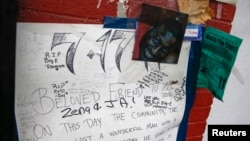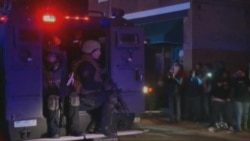A grand jury in New York City voted Wednesday not to indict a white police officer in the chokehold death of an unarmed black man in July.
The officer, Daniel Pantaleo, was seen in a widely circulated video recorded July 17 with his arm wrapped around Eric Garner’s neck, wrestling him to the ground in an attempt to arrest him for allegedly selling untaxed cigarettes on Staten Island.
The heavyset 43-year-old Garner, who had asthma, was heard repeatedly gasping, "I can't breathe!''
The city's medical examiner ruled that Garner’s death was a homicide resulting from the chokehold and the compression of his chest by police officers. New York Police Department officials have said the chokehold technique generally is not allowed.
Police union officials and Pantaleo's lawyer argued that the officer used a takedown move taught by the police department, not a banned maneuver, because Garner was resisting arrest. They said his poor health was the main reason he died.
Benjamin Carr, Garner's stepfather, said he was distraught over the verdict. “Put it in the hands of the federal government. Let them do something about it,” he said.
Federal probe
In a move aimed at de-escalating tension, U.S. Attorney General Eric Holder announced late Wednesday that he was opening a federal civil rights investigation into Garner’s death, a move that Garner’s family and activists have called for in recent months.
The grand jury decision comes less than two weeks after another grand jury in Ferguson, Missouri, declined to indict a white officer who fatally shot an unarmed black teenager during a street confrontation. That decision led to weeks of protests and violence that resulted in more than 100 arrests and the destruction of 12 commercial buildings by fire.
In New York, protesters gathered in the city's Times Square, some holding signs that said "Black lives matter,'' "Fellow white people, wake up'' and "Once again, no justice.''
About two dozen demonstrators lay down in the middle of Grand Central Station's main hall in Manhattan, in a silent protest as the evening rush hour began.
At the site where Garner was apprehended by police and a makeshift memorial to his honor now stands, tempers flared as about a dozen protesters expressed their anger at the grand jury's decision with a protest on the sidewalk. Some demonstrators defiantly crushed cigarettes in front of reporters and passers-by — a reference to the reason that police gave for approaching Garner in the first place.
'They just don't like us'
Daniel Skelton, a black 40-year-old banker, spoke loudly as he expressed his outrage steps away from Garner's memorial.
“They just don't like us,” he said, referring to police. Skelton called his reaction “not so much anger as frustration. A black man's life just don't matter in this country."
In his first public comments on the death, Pantaleo said he prays for Garner's family and hopes they accept his condolences. But Garner's mother said she was "truly" disappointed in the grand jury's decision.
President Barack Obama reacted swiftly to the grand jury decision, saying the case reflected a longtime "concern on the part of too many minority communities that law enforcement is not working with them, and dealing with them in a fair way."
"We are not going to let up until we see a strengthening of the trust and a strengthening of the accountability that exists between our communities and our law enforcement," he said.
New York Mayor Bill de Blasio called it a “deeply emotional day” for the Garner family and all New Yorkers, acknowledging that many people did not agree with the grand jury’s decision. He said the decision created "a national moment of pain, a national moment of grief and searching for a solution."
It is rare for either federal or state prosecutors to charge a U.S. police officer for excessive force, even when a death results.
Officers' credibility
“There are a lot of cases where police officers don't get indicted for what looks like extreme situations,” said Aaron Mysliwiec, president of the New York State Association of Criminal Defense Lawyers. “Many jurors and judges tend to believe police officers more than your average witness.”
The U.S. Supreme Court and lower courts have over decades ruled that police officers should have wide latitude to use violence to defend themselves and to take suspects into custody.
In the aftermath of the Garner incident, New York Police Commissioner Bill Bratton said every officer in the police department, the nation's largest police force, would have to undergo new training. He said it would emphasize tactics that could calm an encounter, something the police department has described as “verbal judo.”
Some information for this report came from Reuters.
Watch related video report by VOA's Chris Simkins







